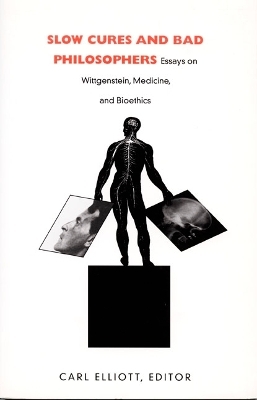
Slow Cures and Bad Philosophers
Duke University Press (Verlag)
978-0-8223-2646-5 (ISBN)
Slow Cures and Bad Philosophers uses insights from the philosophy of Ludwig Wittgenstein to rethink bioethics. Although Wittgenstein produced little formal writing on ethics, this volume shows that, in fact, ethical issues permeate the entirety of his work. The scholars whom Carl Elliott has assembled in this volume pay particular attention to Wittgenstein’s concern with the thick context of moral problems, his suspicion of theory, and his belief in description as the real aim of philosophy. Their aim is not to examine Wittgenstein’s personal moral convictions but rather to explore how a deep engagement with his work can illuminate some of the problems that medicine and biological science present.
As Elliott explains in his introduction, Wittgenstein’s philosophy runs against the grain of most contemporary bioethics scholarship, which all too often ignores the context in which moral problems are situated and pays little attention to narrative, ethnography, and clinical case studies in rendering bioethical judgments. Such anonymous, impersonal, rule-writing directives in which health care workers are advised how to behave is what this volume intends to counteract. Instead, contributors stress the value of focusing on the concrete particulars of moral problems and write in the spirit of Wittgenstein’s belief that philosophy should be useful. Specific topics include the concept of “good dying,” the nature of clinical decision making, the treatment of neurologically damaged patients, the moral treatment of animals, and the challenges of moral particularism.
Inspired by a philosopher who deplored “professional philosophy,” this work brings some startling insights and clarifications to contemporary ethical problems posed by the realities of modern medicine.Contributors. Larry Churchill, David DeGrazia, Cora Diamond, James Edwards, Carl Elliott, Grant Gillett, Paul Johnston, Margaret Olivia Little, James Lindemann Nelson, Knut Erik Tranoy
Carl Elliott is Associate Professor of Pediatrics and Philosophy at the Center for Bioethics, the University of Minnesota. He is the author of A Philosophical Disease: Bioethics, Culture, and Identity and The Rules of Insanity: Moral Responsibility and Mental Illness, and coeditor of The Last Physician: Walker Percy and the Moral Life of Medicine, also published by Duke University Press.
Acknowledgments
Abbreviations
1. Introduction: Treating Bioethics / Carl Elliott
2. Religion, Superstition, and Medicine / James C. Edwards
3. Patient Multiplicity, Medical Rituals, and Good Dying: Some Wittgensteinian Observations / Larry Churchill
4. “Unlike Calculating Rules?”: Clinical Judgment, Formalized Decision Making, and Wittgenstein / James Lindemann Nelson
5. Wittgenstein’s Startling Claim: Consciousness and the Persistent Vegetative State / Grant Gillett
6. Attitudes, Souls, and Persons: Children with Severe Neurological Impairment / Carl Elliott
7. Why Wittgenstein’s Philosophy Should Not Prevent Us From Taking Animals Seriously / David DeGrazia
8. Injustice and Animals / Cora Diamond
9. Bioethics, Wisdom, and Expertise / Paul Johnston
10. Wittgensteinian Lessons on Moral Particularism / Margaret Olivia Little
11. Wittgenstein: Personality, Philosophy, Ethics / Knut Erik Tranöy
Notes on Contributors
Index
| Verlagsort | North Carolina |
|---|---|
| Sprache | englisch |
| Maße | 152 x 229 mm |
| Gewicht | 454 g |
| Themenwelt | Geisteswissenschaften ► Philosophie ► Philosophie der Neuzeit |
| Medizin / Pharmazie ► Medizinische Fachgebiete ► Medizinethik | |
| Studium ► Querschnittsbereiche ► Geschichte / Ethik der Medizin | |
| Naturwissenschaften ► Biologie | |
| ISBN-10 | 0-8223-2646-9 / 0822326469 |
| ISBN-13 | 978-0-8223-2646-5 / 9780822326465 |
| Zustand | Neuware |
| Haben Sie eine Frage zum Produkt? |
aus dem Bereich


